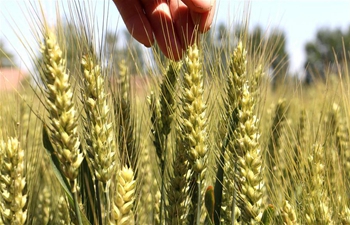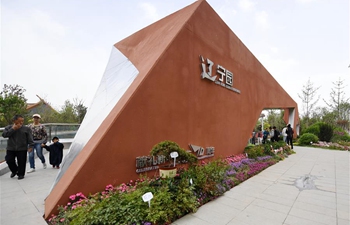YINCHUAN, May 21 (Xinhua) -- When tourists flooded to her hometown of Shapotou, a popular tourist destination in northwest China's Ningxia Hui Autonomous Region, Zhang Yuzhen and her husband opted to experience the beauty in eastern China.
The night scene on a cruise over the Huangpu River in Shanghai left a deep impression on Zhang, who has been a farmer in the western inland most of her life. She also spent time reflecting upon history at the Nanjing Zhongshan Mountain National Park in Jiangsu Province and visited the breath-taking beauty of the West Lake in Hangzhou, capital of Zhejiang Province.
"I have seen them on TV, but the real sceneries were so much better," said Zhang, 66.
Zhang and her husband Mai Anquan, 70, were among a group of tourists recently organized by a tour agency in Ningxia to visit six cities in eastern China. More than 30 people joined the tour, many of whom were farmers from the inland areas.
As China's tourism industry hits the high road amid rising economic growth and disposable income, Chinese farmers, who account for about 40 percent of the country's total population, are beginning to leave their villages to travel around the country.
According to government figures, in 2008, only about 1 billion trips were made by rural residents. Last year, the number jumped to 1.42 billion. In addition, tourism expenses and average spending showed rapid growth.
However, due to barriers such as education and language, rural residents have been primarily limited to group tours and family tours.
When in Shanghai, Zhang's husband Mai Anquan stood on the top of the 400-meter-plus Shanghai Jinmao Tower taking in the aerial view and sighed, filled with emotion.
"I have been a construction worker for many years, but the tallest building I have ever helped build was just 30 stories," said Mai. "I never believed buildings could be so tall until I saw it in real life."
Zhang Yuzhen loved traveling when she was young. However, back in the 1980s and 1990s, when tourism began to boom, she was busy toiling in the fields and making money to support her family, as most farmers did in China. Traveling was barely an option, she said.
"At that time, all I thought about was growing more crops to help my children live better lives," Zhang recalled. "I had no extra money or time for traveling."
Zhang said that going to the nearest town for a market fair or riding a bicycle to a relative's house was her equivalent to travel at the time.
Before the tour in eastern China, Zhang and Mai's travels were mainly restricted in Ningxia. The farthest place they had been to was Kongtong Mountain in the neighboring Gansu Province.
"Our children have all married, and we have some extra money," Zhang said. "So we decided to go on travels while we are still able to."
"They were really happy to be on tour," said the tour guide Zhang Pengxue. "They got up really early every day and looked forward to visiting every new place of interest."
It was Zhang Pengxue's first tour that consisted of aging farmers. She was surprised to find out about the huge potential.
"The senior citizens bought many souvenirs for themselves and their family members," she said.
For the tour, Zhang and her husband spent more than 7,000 yuan (1,013 U.S. dollars), with half of it being spent on shopping.
"We ate tasty food, visited interesting places, took photos and bought what we wanted," Zhang said. "We did not want to have any regrets."
Travel agencies in China have caught wind of the potential market among the 560 million farmers in the country and are beginning to set up outlets in rural areas.
Take the China Travel Service (CTS) for example. The agency's Ningxia branch has set up 34 outlets in the region, with many in the countryside.
"Many young people are working in big cities, so the senior farmers staying home have become our potential main customers," said Qu Xuexia, with the CTS's Ningxia branch. "We are making some new travel routes specially designed for the farmers."
The tourism market for farmers is "a huge cake," Qu said.
"We plan to do surveys in some villages to understand their specific needs for traveling so that our travel routes will be more precisely aligned to their needs," Qu said.

















